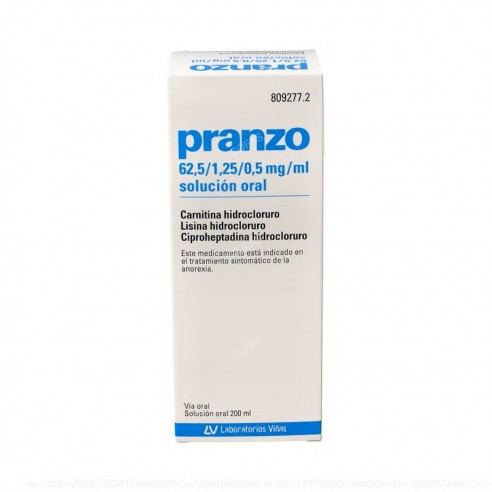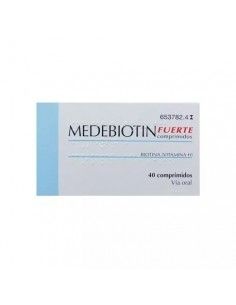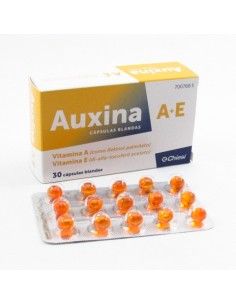ACTION AND MECHANISM
Association of orexigen (appetite stimulant) and amino acids. The appetite stimulant effect is mainly due to the anti-serotonergic action of cyproheptadine, by antagonising serotonin 5-HT2 (S2) receptors. It also has H1 antihistamine and anticholinergic (M) actions.
ELDERLY
In elderly people treated with antihistamines, dizziness, sedation, confusion and hypotension are more likely to occur, as well as a paradoxical reaction characterised by hyperexcitability. Geriatric patients are more sensitive to anticholinergic side effects of antihistamines, such as dry mouth and urinary retention. If these effects persist or are severe, the medication should probably be discontinued.
CONTRAINDICATIONS
- Allergy to cyproheptadine or other components of the formula - [ASTHMATIC CRISIS] - Pregnancy, lactation and children under 2 years of age - Malignant [CANCER] (may promote its development) - Pregnancy, lactation and children under 2 years of age - Malignant [CANCER] (may promote its development).
PREGNANCY
FDA Category B. Studies in rats have not recorded teratogenic effects. In humans there are no adequate and well-controlled studies. However, there are isolated cases of children with cleft lip and hypospadias with the use of cyproheptadine during the first trimester, although a causal relationship cannot be established. Cyproheptadine has been used to prevent miscarriage in patients with elevated serotonin production and in the treatment of Cushing's syndrome with no congenital problems observed with its use. The use of this drug is only acceptable in the absence of safer therapeutic alternatives.
INDICATIONS
- ANOREXIA], [ASTHENIA], [CONVALECENCE], defatiguing.
INTERACTIONS
- Alcohol: studies with other antihistamines (chlorpheniramine, diphenhydramine, promethazine) have reported impairment of motor and/or mental function due to possible addition of their central depressant effects - Antidepressants (fluoxetine, phenelzine, paroxetine): studies have reported inhibition of antidepressant effect. The mechanism has not been established although it is suggested that cyproheptadine may antagonise the serotonergic effects of antidepressants.
BREASTFEEDING
It is not known whether this medicinal product is excreted in significant amounts in breast milk, and whether this could affect the child. It is recommended that breast-feeding be discontinued or that administration of this medicinal product be avoided.
CHILDREN
The safety and efficacy of cyproheptadine have not been established in children under 2 years of age. It is not recommended for use in premature infants and newborns because they are more sensitive to anticholinergic side effects of antihistamines, such as CNS excitation. In older children treated with antihistamines, a paradoxical reaction characterised by hyperexcitability may occur.
GUIDELINES FOR CORRECT ADMINISTRATION
Take 1 h before meals.
DOSAGE
Adults: 1 spoonful (10 ml) 3 times a day. Children: From 2 to 6 years old: 1 teaspoon (of 5 ml) 1-2 times a day. From 6 to 14 years old: 1 teaspoon (10 ml) 2 times a day.
PRECAUTIONS
- Due to its anticholinergic effects, special clinical monitoring should be carried out in patients with [EPILEPSIA], chronic [ASTHMA], [CHRONIC OBSTRUCTIVE PULMONARY DISEASE], [GLAUCOMA], [INTESTINAL OBSTRUCTION] or [OBSTRUCTIVE UROPATIA], [URINARY RETENTION], [PROSTATIC HYPERPLASIA], [HYPERTHYROIDISM], [ARTERIAL HYPERTENSION]. - It is not advisable to drive vehicles or operate dangerous or precision machinery under its effect (may reduce the ability to concentrate and reflexes) - Elderly and debilitated patients are more sensitive to anticholinergic effects (greater predisposition to experience sedation, dizziness and hypotension).
PRECAUTIONS REGARDING EXCIPIENTS
- This medicinal product contains ethanol. It is recommended to check the composition for the exact amount of ethanol per dose.
* Amounts less than 100 mg/dose are considered small and are not usually harmful, especially in children.
* Amounts greater than 100 mg/dose may be harmful in people with [CHRONIC ALCOHOLISM], and should also be considered in pregnant and lactating women, children, and in high-risk groups, such as patients with liver disease ([LIVER INSUFFICIENCY], [LIVER CIRROSIS], [HEPATITIS]) or [EPILEPSIA].
* The amount of alcohol in this medicinal product (well below the 3 g/dose limit) is not expected to impair the ability to drive or operate machinery, or to interfere with the effects of other medicinal products.
ADVERSE REACTIONS
Adverse effects of cyproheptadine are generally mild and transient. The most characteristic adverse reactions are:- Occasionally (1-9%): drowsiness, dry mouth, blurred vision; - Rarely (<1%): constipation, mydriasis, accommodation disorders, mental confusion in the elderly, excitement and insomnia in young children, urinary retention, palpitations, hypotension, headache, exanthematous eruptions, urticaria, photodermatitis.
ADVERSE REACTIONS RELATED TO EXCIPIENTS
- Propyl parahydroxybenzoate may cause [HYPERSENSITIVITY REACTIONS] (possibly delayed).









